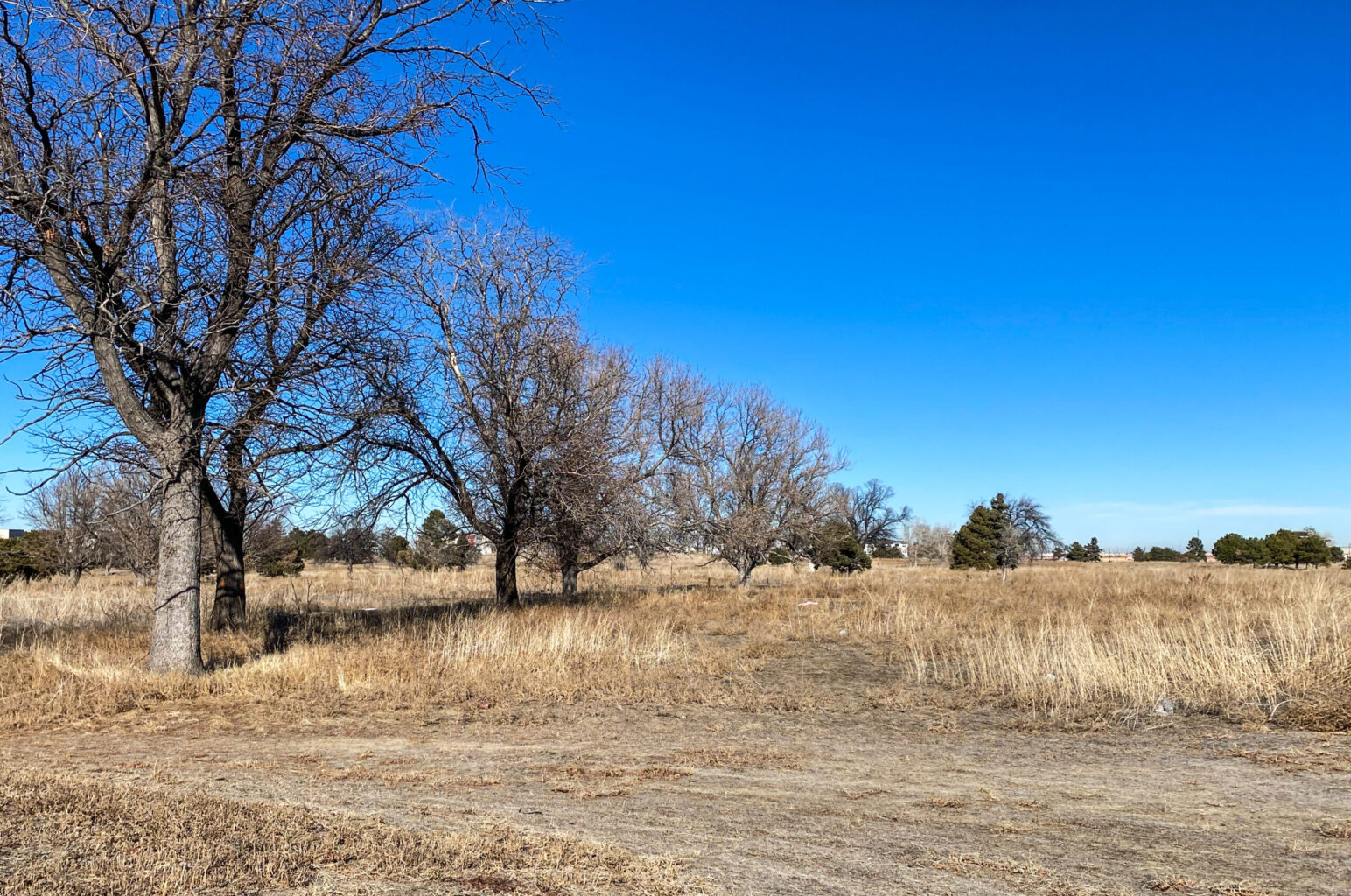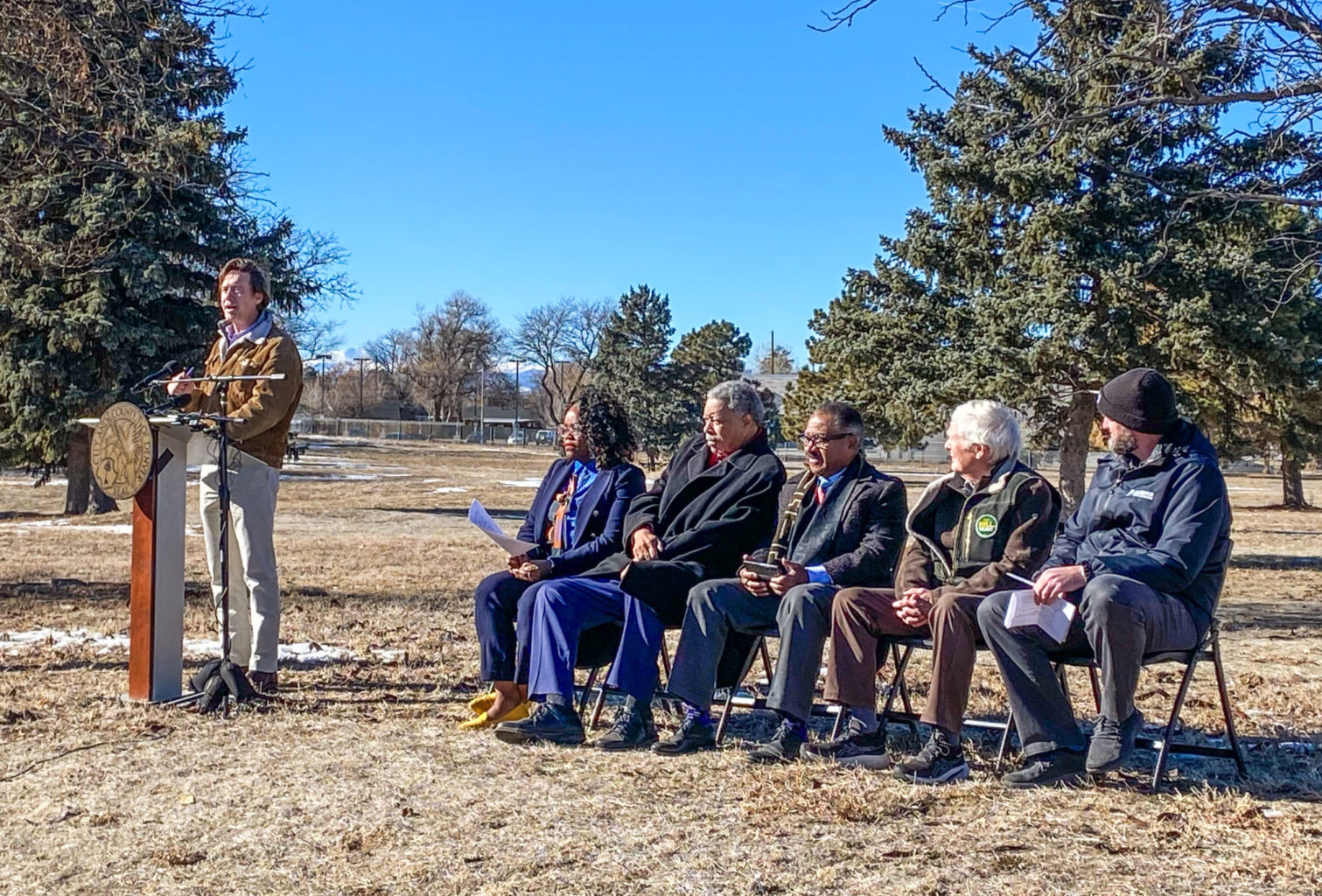
The grounds of the Park Hill Golf Course.
Surrounded by fences and controversy, the 155-acre Park Hill Golf Course site is being acquired by the City and County of Denver for a new city park in a land exchange agreement.
The new park will be what Mayor Mike Johnston calls “the largest acquisition of a new park to our park system in more than 100 years.”
The agreement involves the exchange of 145 acres of undeveloped City-owned land near Denver International Airport in Adams County for the golf course property, which is owned by Westside Investment Partners. The golf course closed in 2018.
“We believe Park Hill can be a crown jewel of Denver,” Johnston said at a news conference at the golf course site. “This is an incredible opportunity to remake a space that has been neglected and unused for far too long. Together, we can make this the go-to destination for runners, readers, cyclists, picnickers, birdwatchers, and of course, children and families. This site will be all of Denver’s to cherish for generations to come.”

Mayor Mike Johnston speaks to a crowd at the Park Hill Golf Course.
Denver Parks & Recreation will oversee the park with hopes of opening it to the public by this summer. Safety issues need to be addressed first, including fixing broken walkways and trimming back overgrown trees and brush.
Entranceways will be created to enter the area, but it will take time and community input to create a long-term plan for what this yet unnamed park will look like.
Jolon Clark, executive director of Denver Parks and Recreation, told the crowd gathered at the site that he is excited about the challenge ahead and the chance to work with the community. “When people think of Denver, they already think of Wash Park, and they think of City Park, and they think of Sloan’s Lake, and now they’re going to think of this park, and we want you to be a part of it as we continue to build that vision…you’re going to help us build it.”
Johnston acknowledged community support and years of advocacy for the land purchase by leaders like former Mayor Wellington Webb and Save Open Space Denver members, including Woody Garnsey and Penfield Tate III.
In 1997, under Webb’s administration, the Denver City Council voted to pay $2 million for a “conservation easement” on the privately-owned Park Hill Golf Course land.
Denver residents in 2023 voted against a ballot initiative to lift the conservation easement that prevents the land of the former golf course from being used for any development purposes. If voters had approved the measure and lifted the easement, Westside Investment Partners would have been allowed to build a mixed-use development on the site, including housing, a park, and possibly a grocery store.
“We know that on both sides of this debate, there was agreement that we still need to make sure that this neighborhood remains affordable. We still need to make sure that this neighborhood does not continue to be a food desert without access to regular and affordable food and groceries,” Johnston said.
“We believe that Denver is a place that is still pro-growth and pro-open space, and it’s possible to be both, and that’s what today is about,” he said. “…We know there is a housing shortage in Denver. We want to add more housing stock. …We want to make sure it’s a priority neighborhood that’s historically lacked access to affordable housing and [where people] risk being pushed out of this neighborhood too many times when the costs have gone up.”
Said Tate: “We know the city needs a lot of things like affordable housing and others, but our position has always been ‘build around, not on,’ because we can’t replicate this site anywhere else in the city. Once it’s gone, it’s gone, and we will never get it back.”
The Denver City Council and Adams County Board of Commissioners still need to approve the deal. Work should begin as soon as the deal is finalized.
And when asked about what message the land deal sends to developers, Johnston answered: “There are plenty of places to develop that are not on the Park Hill Golf Course.”
Webb agreed, saying, “Developers can develop, not on park space. This is about the City. The real winners today are the people of Denver.”
Park Hill opened as a private golf course in the 1930s. With the exception of the occasional celebrity, and despite the surrounding area being largely made up of Black residents, Black people were mostly barred from playing in the club until the 1970s.
With the 1970s came increased and active participation by Black golfers, including Tiger Woods, and other patrons. The golf course closed in 2018 and currently is fenced off to the public.
Front Porch photos by Linda Kotsaftis


0 Comments